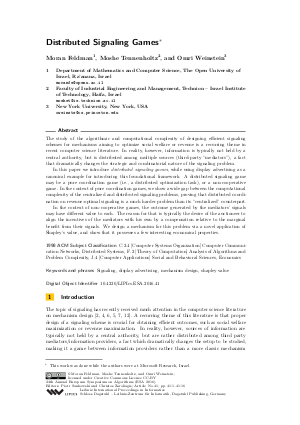Distributed Signaling Games
Authors Moran Feldman, Moshe Tennenholtz, Omri Weinstein
-
Part of:
Volume:
24th Annual European Symposium on Algorithms (ESA 2016)
Part of: Series: Leibniz International Proceedings in Informatics (LIPIcs)
Part of: Conference: European Symposium on Algorithms (ESA) - License:
 Creative Commons Attribution 3.0 Unported license
Creative Commons Attribution 3.0 Unported license
- Publication Date: 2016-08-18
File

PDF
LIPIcs.ESA.2016.41.pdf
- Filesize: 0.57 MB
- 16 pages
Document Identifiers
Subject Classification
Keywords
- Signaling
- display advertising
- mechanism design
- shapley value
Metrics
- Access Statistics
-
Total Accesses (updated on a weekly basis)
0Document
0Metadata
Abstract
The study of the algorithmic and computational complexity of designing efficient signaling schemes for mechanisms aiming to optimize social welfare or revenue is a recurring theme in recent computer science literature. In reality, however, information is typically not held by a central authority, but is distributed among multiple sources (third-party "mediators"), a fact that dramatically changes the strategic and combinatorial nature of the signaling problem. In this paper we introduce distributed signaling games, while using display advertising as a canonical example for introducing this foundational framework. A distributed signaling game may be a pure coordination game (i.e., a distributed optimization task), or a non-cooperative game. In the context of pure coordination games, we show a wide gap between the computational complexity of the centralized and distributed signaling problems, proving that distributed coordination on revenue-optimal signaling is a much harder problem than its "centralized" counterpart. In the context of non-cooperative games, the outcome generated by the mediators' signals may have different value to each. The reason for that is typically the desire of the auctioneer to align the incentives of the mediators with his own by a compensation relative to the marginal benefit from their signals. We design a mechanism for this problem via a novel application of Shapley's value, and show that it possesses a few interesting economical properties.
Cite As Get BibTex
Moran Feldman, Moshe Tennenholtz, and Omri Weinstein. Distributed Signaling Games. In 24th Annual European Symposium on Algorithms (ESA 2016). Leibniz International Proceedings in Informatics (LIPIcs), Volume 57, pp. 41:1-41:16, Schloss Dagstuhl – Leibniz-Zentrum für Informatik (2016)
https://doi.org/10.4230/LIPIcs.ESA.2016.41
BibTex
@InProceedings{feldman_et_al:LIPIcs.ESA.2016.41,
author = {Feldman, Moran and Tennenholtz, Moshe and Weinstein, Omri},
title = {{Distributed Signaling Games}},
booktitle = {24th Annual European Symposium on Algorithms (ESA 2016)},
pages = {41:1--41:16},
series = {Leibniz International Proceedings in Informatics (LIPIcs)},
ISBN = {978-3-95977-015-6},
ISSN = {1868-8969},
year = {2016},
volume = {57},
editor = {Sankowski, Piotr and Zaroliagis, Christos},
publisher = {Schloss Dagstuhl -- Leibniz-Zentrum f{\"u}r Informatik},
address = {Dagstuhl, Germany},
URL = {https://drops.dagstuhl.de/entities/document/10.4230/LIPIcs.ESA.2016.41},
URN = {urn:nbn:de:0030-drops-63536},
doi = {10.4230/LIPIcs.ESA.2016.41},
annote = {Keywords: Signaling, display advertising, mechanism design, shapley value}
}
Author Details
References
-
Robert J. Aumann. Agreeing to Disagree. The Annals of Statistics, 4(6):1236-1239, 1976.

- Peter Bro Miltersen and Or Sheffet. Send mixed signals: Earn more, work less. In EC, pages 234-247, New York, NY, USA, 2012. ACM. URL: http://dx.doi.org/10.1145/2229012.2229033.
- Ruggiero Cavallo, R. Preston McAfee, and Sergei Vassilvitskii. Display advertising auctions with arbitrage. ACM Trans. Economics and Comput., 3(3):15, 2015. URL: http://dx.doi.org/10.1145/2668033.
- Yu Cheng, Ho Yee Cheung, Shaddin Dughmi, and Shang-Hua Teng. Signaling in quasipolynomial time. CoRR, abs/1410.3033, 2014. URL: http://arxiv.org/abs/1410.3033.
- Shaddin Dughmi. On the hardness of signaling. In 55th IEEE Annual Symposium on Foundations of Computer Science (FOCS), pages 354-363, 2014. URL: http://dx.doi.org/10.1109/FOCS.2014.45.
- Shaddin Dughmi, Nicole Immorlica, and Aaron Roth. Constrained signaling in auction design. In Twenty-Fifth Annual ACM-SIAM Symposium on Discrete Algorithms (SODA), pages 1341-1357, 2014. URL: http://dx.doi.org/10.1137/1.9781611973402.99.
- Yuval Emek, Michal Feldman, Iftah Gamzu, Renato Paes Leme, and Moshe Tennenholtz. Signaling schemes for revenue maximization. ACM Trans. Economics and Comput., 2(2):5, 2014. URL: http://dx.doi.org/10.1145/2594564.
- Eyal Even-Dar, Michael J. Kearns, and Jennifer Wortman. Sponsored search with contexts. In Internet and Network Economics, Third International Workshop (WINE), pages 312-317, 2007. URL: http://dx.doi.org/10.1007/978-3-540-77105-0_32.
-
Ronald Fagin, Joseph Y. Halpern, Yoram Moses, and Moshe Vardi. Reasoning About Knowledge. MIT Press, 1995.

- Moran Feldman, Moshe Tennenholtz, and Omri Weinstein. Distributed signaling games. CoRR, abs/1404.2861v2, 2015. URL: http://arxiv.org/abs/1404.2861v2.
- Arpita Ghosh, Hamid Nazerzadeh, and Mukund Sundararajan. Computing optimal bundles for sponsored search. In Internet and Network Economics, Third International Workshop (WINE), pages 576-583, 2007. URL: http://dx.doi.org/10.1007/978-3-540-77105-0_63.
- Mingyu Guo and Argyrios Deligkas. Revenue maximization via hiding item attributes. In IJCAI, 2013. URL: http://www.aaai.org/ocs/index.php/IJCAI/IJCAI13/paper/view/6909.
- Johan Håstad. Clique is hard to approximate within 1 - ε. Acta Mathematica, 182(1):105-142, 1999. URL: http://dx.doi.org/10.1007/BF02392825.
-
Jacob Marschak and Roy Radner. Economic theory of teams. Cowles foundation for research in economics at Yale University. Yale University Press, New Haven and London, 1972.

- Jonathan R. Mayer and John C. Mitchell. Third-party web tracking: Policy and technology. In IEEE Symposium on Security and Privacy (SP), pages 413-427, 2012. URL: http://dx.doi.org/10.1109/SP.2012.47.
- Tim Roughgarden and Mukund Sundararajan. New trade-offs in cost-sharing mechanisms. In The Thirty-Eighth Annual ACM Symposium on Theory of Computing (STOC), pages 79-88, 2006. URL: http://dx.doi.org/10.1145/1132516.1132528.
-
L. S. Shapley. A value for n-person games. Contributions to the theory of games, 2:307-317, 1953.

-
Shuai Yuan, Jun Wang, and Xiaoxue Zhao. Real-time bidding for online advertising: Measurement and analysis. In The Seventh International Workshop on Data Mining for Online Advertising (ADKDD), pages 3:1-3:8, 2013.

